 | |||||||||||
|
|
|
|
|
|
|
||||||
|
| |||||||||||
|
11/14/2009 Pelagic Research Foundation takes research to the sky with Specialized HelicoptersBy Alia WilsonWATSONVILLE -- Pelagic Shark Research Foundation researchers and Watsonville's Specialized Helicopters are teaming up to offer people the chance help pay for and participate in aerial research of Monterey Bay. "The public gets to come with us, be a sponsor for the day and we get to add to our reporting network of researchers," said Sean Van Sommeran of the Pelagic Shark Research Foundation. "Students would be able to come up with us as well as independent researchers. It's definitely got potential and always had the potential, which is why we relied on aerial surveys periodically here and elsewhere. To have these assets available allows us to get a lot done." Sponsors get to ride along in the helicopter on excursions to Big Sur, Carmel, Monterey and Santa Cruz. Total cost for each trip depends on the destination but ranges from $200 to $660 and can be split between three passengers. Marine biology students will receive training and work toward becoming a qualified observer while looking out bubble observation windows of the helicopter. The team took to the sky Friday in search of a basking shark, the second largest living shark after the whale shark, in hopes of being the first in the area to put a transmitter on one. As the helicopter hovered 1,000 feet above Monterey Bay, Van Sommeran documented wildlife activity through pictures and video. Specialized Helicopters chief pilot Chris Gularte cruised in his R44 helicopter from Salinas to Santa Cruz in minutes. Van Sommeran said the idea came as a solution to the high cost of the excursions. Aerial surveys and tours can run up to $100 per hour. "With a shoestring budget, this has enabled us to do a lot," Van Sommeran said. "I certainly didn't have the budget to do that." Gularte said sponsoring aerial surveys is something he has been hoping to put together for nearly 15 years. He got in contact with Van Sommeran during the summer and took him up for free. Friday marked the fourth excursion for the team. "You see so many things when you're in the air, it really opens your eyes," Gularte said. "I've lived here for nearly 40 years and I never realized that leatherback sea turtles come through here. Being able to see all of that makes you want to protect it." During an aerial survey in October, the team spotted a great white shark off Seacliff State Beach and notified lifeguards. "Aircraft are an excellent research tool for naturalists," Van Sommeran said. "In a fixed-wing you do get an excellent scope of things but in a helicopter you have a consistent point of contact." No basking shark surfaced during the Friday sky safari, but a humpback whale and her calf along with a small pod of bottlenose dolphins could be seen feeding off of the coast of Pajaro Dunes. Van Sommeran said he hopes to tag a basking shark, which was a big harpooning target in the 1950s, and study the creature's behavior. "The first step to protecting is understanding," Van Sommeran said. "Sharks have so many bad implications attached to the them. The basking shark is similar to a whale in that it filter feeds and doesn't have all the teeth." Van Sommeran said the Pelagic Shark Research Foundation is working with the Hopkins Marine Station of Stanford University to attach satellite trackers to a basking shark to keep tabs on its travels and behavior. "This has been a first-rate opportunity," Van Sommeran said. "I'm certainly happy to help explore the potential in developing it." To learn more about being a public sponsor visit http://specializedheli.com/default.aspx or call 763-2244. If you goSky Safari Original URL (may no longer function):
Copyright © Santa Cruz Sentinel. All rights reserved.
|
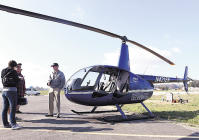 Specialized Helicopters of Watsonville has teamed up with the Pelagic Shark Research Foundation to provide researchers with flight time (Phil Carter/Sentinel) 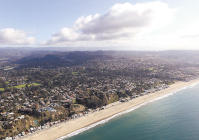 Researchers from the Pelagic Shark Foundation use aerial surveying to search for sharks and other sea life along the entire Monterey Bay coast. (Phil Carter/Sentinel) 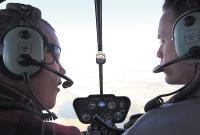 Researcher Sean Van Sommeran (left) of the Pelagic Shark Foundation and Chief Pilot Chris Gularte (right) of Specialized Helicopters have teamed up on a number of occasions to conduct research from the air. (Phil Carter/Sentinel) 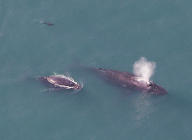 A humpback whale and her calf surface for air just off the coast south of Santa Cruz on Friday (Phil Carter/Sentinel) 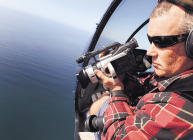 Sean Van Sommeran, executive director of the Pelagic Shark Research Foundation, scans the waters of Monterey Bay from a helicopter Friday morning. Van Sommeran has been working with Specialized Helicopters in Watsonville to conduct aerial surveys of the coastal waters (Phil Carter/Sentinel) | |||||||
|